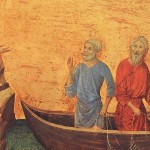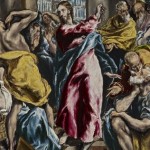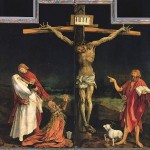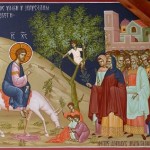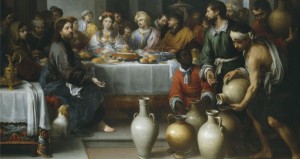 The ancients believed that January 6 was the winter solstice, that time when the days of the year begin becoming longer – in other words, when the sun was beginning to ascend again. Various religions associated this with the sun god. This time of year was also tied in with pagan rituals of spring purification, so it became a day for baptism and a day when water was consecrated, when common water was made into holy water.
The ancients believed that January 6 was the winter solstice, that time when the days of the year begin becoming longer – in other words, when the sun was beginning to ascend again. Various religions associated this with the sun god. This time of year was also tied in with pagan rituals of spring purification, so it became a day for baptism and a day when water was consecrated, when common water was made into holy water.
This theme of God using water, one of most common substances on earth, to show God’s power is true not only in baptism but here in Jesus’ 1st miracle – the transformation of the water into wine. Through the common substance of water God teaches us about Himself and His loving plan for us. Through water, God makes a series of startling revelations to us.
In this miracle, God reveals Himself to man as a God who speaks and who cares. When we understand the fundamental theme of Epiphany, which is God revealing Himself to man, then we can see that all of life is in a sense one great Epiphany.
God’s revelation of Himself in his Holy Word is progressive. God revealed Himself first through His line of chosen men from Adam and Noah, and then through Abraham and the patriarchs and the nation of Israel. Jesus Christ Himself is, of course, the most perfect revelation, but God continues to reveal Himself through His people, the Church, as they abide in His Word.
Creation itself also reveals God to us. The very fact that there is a universe which is such as this universe demonstrates to all that there is a God and who He is. As Psalm 19 says: “The heavens declare the glory of God, the skies proclaim the work of His hands.” Even history teaches us that there is a God. The unveiling of His plan in time also instructs us about his nature and will.
In fact, since everything that exists was created by God, it all in a way reveals Him. God’s work is His epiphany.
This particular miracle of the water and wine also reveals that Jesus Christ is the Lord God. In due time it was revealed that it was God Himself who was performing the miracle. This Jesus of Nazareth was in fact God Almighty.
The impact of the miracle wouldn’t have been lost on the Jews of the time. In ancient pagan cultures, there were often gods and religious rituals surrounding wine. For example, Dionysus was the Greek god of wine and nature. The Greek religion was propagated throughout the ancient world, especially by Alexander the Great, so that even Jews would be familiar with some of their gods and practices.
In this miracle, Jesus Christ demonstrates that He alone is truly the God of wine and nature. He is superior to Dionysus and every other so-called god of the ancient world. Only God Himself could take water and turn it into wine. It’s one thing to say that Dionysus (or whoever) is the god who gives wine: anyone can say that about their god, and there isn’t much you can do to disprove it. But here, with this miracle, only Christians can say that their God can make wine out of water before human witnesses.
This transformation of the water to the wine therefore also reveals that Jesus Christ is Lord of creation. Miracles are commonly defined as, “God working in ways which are not customary for Him; God for a moment transcending the laws He has imposed on His creation.” Only the power of God can perform a miracle, and so those who perform them are either God Himself or those invested by Him with His power.
Jesus, the Lord of Creation, took something very common and made it into something of great value. He took that which covers 70% of earth’s surface and costs us something like 1/2 cent per gallon and transformed it into something that graces only a fraction of the surface of the earth and only where men congregate. Jesus, the
Word, first took the formless earth and then transformed it into a more glorified world, and here, in this miracle, He took water and transformed it into a more glorified form of water. Wine and water are basically the same substance, except that wine has color and body and aroma; it is sweet and has flavors and it makes men feel good and invigorated in a way that water does not. It’s like holy water that has been consecrated and given a more noble and special purpose.
What’s especially amazing to those who don’t see the actual transformation but examine the produce of the miracle is the kind of wine Jesus created. Normally at feasts the wine goes from good to cheap, the wine becoming cheaper as men’s minds are addled and care less about the quality of things, whether food or wine or companions.
I recently had a fascinating conversation about beer with a former student of mine. Somehow, he mentioned that he drank light American beer. I expressed my distaste for American beer, especially light beer, possibly making unflattering comparisons to myself and asking how anyone could possibly like the taste of the stuff. He countered by saying, “I don’t drink it for the taste: I drink it to get intoxicated.”
“Oh, I said. And I drink beer to savor the flavor, so I drink Guinness Stout.”
The ruler of the feast at once is astonished by the stupidity of the bridegroom. Apparently he had made a mistake because here, at the end of the feast, instead of breaking out the Thunderbird, he brought out 120 gallons of Dom Perignon.
Whatever else we might say about this first miracle of Jesus’, we must also see what St. John wants us to see. John makes it plain by his very own words: “This beginning of miracles Jesus did in Cana of Galilee, and manifested forth his glory; and his disciples believed on him.”
First, we see that by this miracle Jesus manifested forth his glory, a phrase which has Epiphany written all over it. Remember how we said that God reveals Himself to us progressively. At the birth of Jesus Christ, there were many remarkable ways in which God revealed the glory of His Son. But there is very little between the birth of Christ and His first miracle. It is only natural, therefore, that after the glory of the Son is revealed in His Incarnation during Christmas comes Epiphany, the next step in the progressive revelation of the glory of Jesus Christ.
But if we keep reading, we see that God revealed His glory through His Son – that we might believe. So God gives an epiphany of Himself to, and the response of man is to believe on Him. This is the purpose of this miracle and its meaning. Now we know why this miracle is here. We have seen what God wants us to see about his beloved Son.
This miracle not only reveals that Jesus Christ is God and the Lord of Creation but also that He cares enough about His creation to reveal Himself that we might believe.
Most importantly, God reveals Himself through His Word and through this miracle that we might be transformed. The point of the miracle at the wedding at
Cana isn’t that God has come down to make water into wine. It’s that God has come down to effect the most dramatic and glorious transformation of all: the transfiguration and glorification of men from the Kingdom of Darkness into the Kingdom of Light!
We see symbols of the transfiguration all around us in the Church. In Christmas, Epiphany, and Easter, we find the transfiguration of pagan worship of false gods into true worship of the Creator and Transformer. Christianity always triumphs over the pagans. Throughout the Christian year, Christianity took pagan celebrations and transformed them into the worship of the true God.
In the Holy Communion we see a series of spectacular transfigurations: water into wine, wine into the Body and Blood of Jesus Christ, and the Body and Blood of Christ into us, and us into Him.
This is the best transformation which God has saved for last: that we are transformed from men fit to be cast out and trampled under ground and returned to dust into those made higher than the angels and those transformed into the Temple of the Lord.
It is the miracle of the transformation of God into man and man into union with God. This is the greater miracle that we are reminded of today, the daily miracle of God with us.
Resolution: I resolve to thank God today for the miracle of transformation that He has performed in my life.
Prayer: Teach me, O Lord, to celebrate and remember today the blessed passion and precious death and the mighty resurrection and glorious ascension of the Lord Jesus Christ. Bless and sanctify Your gifts to me this day, especially the daily bread and wine of the presence of Your Son, Jesus Christ. Make me a worthy partaker of Him today in all of the ways He comes to me that I may be filled with Your grace and heavenly benediction and made one body with Him that He may dwell in me and me in Him. Amen.
Point for Meditation:
- Any time you see a transformation of any kind today, give thanks to God, remembering the greater transformation He has worked in you.
- Every time you see water today, recall to mind today’s lesson and your meditations on it.
Wedding at Cana – U.S. Public Domain

